School of Worship in Bulgaria
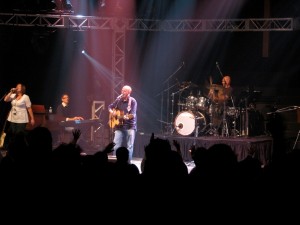 Our Bible School initiative for the Bulgarian Church of God has dedicated the month of December for a special time of praise and worship. We have compiled teachings from lead Bulgarian praise and worship teams to be presented in the School of Worship on topics of personal experience with God and teaching others how to use music in the ministry. Four modules were selected for weekly presentation during the month of December as follows:
Our Bible School initiative for the Bulgarian Church of God has dedicated the month of December for a special time of praise and worship. We have compiled teachings from lead Bulgarian praise and worship teams to be presented in the School of Worship on topics of personal experience with God and teaching others how to use music in the ministry. Four modules were selected for weekly presentation during the month of December as follows:
1. Pastor Iliya Panov teaching at the Life Church of God in Sofia, which he pastors
2. Rev. Daniel Tanev teaching at the DOVE Christian Center in Sliven
3. Missionary Keith de Majo teaching at the Oasis of Love Bible School in Sofia
4. Leadership Conference for Praise and Worship Teams
School of Mission: Missions Week in Bulgaria
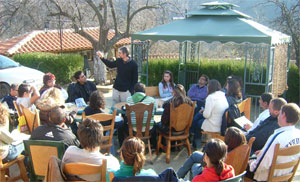 School is in Session: Young Leaders Ministry Retreat with Special Focus on Missions
School is in Session: Young Leaders Ministry Retreat with Special Focus on Missions
It is Missions week in Bulgaria following Thanksgiving. A time to meet with Bulgarian missionaries who travel abroad, discuss their needs and pray for the success of their respective ministries. Our Thanksgiving weekend involved a ministry team retreat in the Balkan Mountains as part of the education program initiated several months ago by our Bible School initiative for the Bulgarian Church of God. As usual, this event was dedicated to training young ministers and their teams and this time the focus of our meeting was missions. Ministry teams represented the Plovdiv, Yambol and Sliven regions. A missionary from Spain was also present for the training.
Keynote speaker of the event was the president of the Bulgarian Missionary Network (BMN), Rev. Ivo Shatrovsky, who shared his calling from God for missions and a personal vision for Bulgarian missions abroad. In his address, he presented several valuable lessons he has learned in his own missionary experience in the West Indies. Two workshops on the topics of Conflict Resolution and Structuring for Growth were further presented by our team. And while various activities were taking place in the midst of extensive discussions, sharing on the part of the missionaries and strategic planning for the future of the represented regions, the time of fellowship turned to a prayerful reflection on God’s calling upon our own lives.
For the mission of the church cannot exist apart from God. It is a calling, not merely a career. It is a cost, not simply a concern. It is a burden, not just a belief. Its focus is care and compassion. And yes, even in the 21st century, it still remains a Holy Ghost uttering, through which one remains blind for the world around until obeying to the vision of heaven (Acts 26:19) and begins seeing the world through the eyes of the Savior.
Day of Reformation in Bulgaria
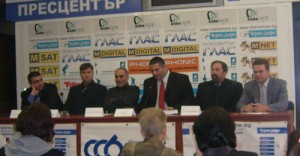 October 31st is celebrated worldwide as Reformation Day – the day when Dr. Martin Luther posted his 95 Thesis on the doors of the Wittenberg Cathedral. The day is reserved in the Bulgarian national calendar as a holiday for the Bulgarian Church of God. Traditionally, Evangelical churches across the nation mark it as “Day of Open Doors,” but this year, the special celebration was accompanied by the 500th anniversary of the birth of John Calvin and the centennial anniversary of the Bulgarian Evangelical Alliance (a.k.a Bulgarian Evangelical Churches). As churches across the country opened the doors of their sanctuaries and toured visitors of all walks of life, we traveled to Bulgaria’s largest port city of Varna for a national press conference at the prestige Festival and Congress Center located in the city’s Black Sea garden. Journalists from various medias who were present posted the news of some 150, 000 Bulgarian protestants nationwide. The press conference was followed by a Mega Youth service in the building of the First Baptist Church of Varna, where youth from all protestant denominations in town were present for an explosive worship lead by the First Assemblies of God praise team and a lecture by our team on the subject of “Reformation for Today.”
October 31st is celebrated worldwide as Reformation Day – the day when Dr. Martin Luther posted his 95 Thesis on the doors of the Wittenberg Cathedral. The day is reserved in the Bulgarian national calendar as a holiday for the Bulgarian Church of God. Traditionally, Evangelical churches across the nation mark it as “Day of Open Doors,” but this year, the special celebration was accompanied by the 500th anniversary of the birth of John Calvin and the centennial anniversary of the Bulgarian Evangelical Alliance (a.k.a Bulgarian Evangelical Churches). As churches across the country opened the doors of their sanctuaries and toured visitors of all walks of life, we traveled to Bulgaria’s largest port city of Varna for a national press conference at the prestige Festival and Congress Center located in the city’s Black Sea garden. Journalists from various medias who were present posted the news of some 150, 000 Bulgarian protestants nationwide. The press conference was followed by a Mega Youth service in the building of the First Baptist Church of Varna, where youth from all protestant denominations in town were present for an explosive worship lead by the First Assemblies of God praise team and a lecture by our team on the subject of “Reformation for Today.”
School is in Session: Bible School in Bulgaria 2009
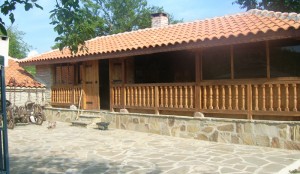 Through the years, the team of Cup & Cross Ministries International has published reports about various educational courses we have taught across the country of Bulgaria. The ministry context, which comprises this need, is a complex combination of political, economical, religious, ethnical and even legal factors. But above all, education through discipleship programs for church congregations as well as for the training of ministry teams is becoming a very essential and growing need in Bulgaria.
Through the years, the team of Cup & Cross Ministries International has published reports about various educational courses we have taught across the country of Bulgaria. The ministry context, which comprises this need, is a complex combination of political, economical, religious, ethnical and even legal factors. But above all, education through discipleship programs for church congregations as well as for the training of ministry teams is becoming a very essential and growing need in Bulgaria.
This year, we have been pressed by this need to organize a practical Bible School for ministry teams which being mobile itself and combing modern technology has been able to serve hundreds of ministers across the country. Just this year, our team has been able to hold ministry team training events for the Church of God congregations within the Dupnitsa, Sofia, Yambol, Samokov, Gabrovo, Veliko Tarnovo, and Sliven regions. Additionally, we have gathered ministers in regional training events in the Northwest (Sofia), Northeast (Varna), Central (Gabrovo), Southeast (Yambol) and Southwest (Dupnitsa, Samokov, Bansko) regions.
These teaching events and ongoing ministry training have proven to be a great aid for ministers nationwide. For example, in the month of September, we were able to team with the Church of God of Prophecy in a nationwide, week-long course on church leadership involving the topics of conflict resolution, team formation, ministry training, use of new technologies in ministry and many other important topics. We held two similar seminars in the cities of Yambol (September 16-19, 2009) and Sliven (September 29, 2009).
During the month of October alone, we led ministry training events in the following schedule:
October 3-5, 2009 Dupnitza Church of God
October 6, 2009 Seminar on internal motivation for Yambol & Sliven
October 13, 2009 Conflict management styles for Yambol & Sliven
October 14, 2009 Bible study on the Epistle to Philemon
October 17, 2009 Regional conference for the Yambol & Sliven regions with some 200 delegates from over 20 various locations.
October 20, 2009 Ministry team formation and leadership for Yambol & Sliven
October 21, 2009 Starting a new Bible book study on the Gospel of Matthew
Our team is continuing teaching and training in the same tempo in various locations in Bulgaria for the remaining of the school year. Overall, we have been able to prepare and offer to the churches and their leaders 12 complete training courses as follows:
1. History of the Bible: Paleography (beginners), Translation Theories (intermediate) and Manuscript Analyses (advanced)
2. Internal Motivation and Stress Management
3. Ministry on the Internet for Pastors and Ministers
4. Parenting Course (various contextualized topics)
5. Practical Church Leadership for the 21st Century (two levels)
6. Sunday School – Doctrinal teachings on the articles of the Church of God Declaration of Faith
7. The Book of Nehemiah (a verse by verse Bible study for church builders)
8. The Book of Revelation (a verse by verse Bible study)
9. The Complete Johanine Writings: Gospel, Epistles and Apocalypse (a practical course for Bible translators)
10. The Epistle to the Galatians (a verse by verse Bible study)
11. The Gospel of Mark (a verse by verse Bible study)
12. The Pastoral Epistles (a verse by verse Bible study)
Ministering at the Newly Founded Church of God in Veliko Tarnovo
As soon as the national leadership training in Rouse was over, we traveled to the ancient Bulgarian capital of Veliko Tarnovo and held service at the newly found Church of God there. The church was started six months ago by Rev. Vasil Petrov, who serves as the pastor of the Gabrovo Church of God and regional bishop for the Bulgarian Church of God. The humble beginnings in the midst of economic, political and church crises have not stopped this congregation of growing and they are now looking for an appropriate size building for meetings. While together we did a practical Bible lesson from the New Bulgarian Translation of the Gospel of John and were encouraged by noticing the eagerness of the people to learn and practice the Word. We were asked to return to Veliko Tarnovo for another Bible training module in the near future. Giving the urgent need for leadership development in the area, we are planning to implement our mobile ministry training strategy in order to support the development of this newly founded local Church of God and to ensure its continues growth and effectiveness in ministry.
Live Broadcast from Bulgaria
Cup & Cross Ministries International will be broadcasting the annual 2009 X event LIVE from Samokov, BULGARIA on September 9, 2009 at 12:00 PM ET
Preaching on II Timothy 4
National Youth Camp in Bulgaria
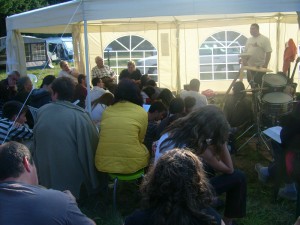 In years past, we have visited and ministered to a dozen different youth camps in Bulgaria. Each of them has been unique and special, but it has been a while since we have ministered at a youth camp where people have been so hungry to receive from God.
In years past, we have visited and ministered to a dozen different youth camps in Bulgaria. Each of them has been unique and special, but it has been a while since we have ministered at a youth camp where people have been so hungry to receive from God.
We were asked to visit the National Youth Camp at Petrohan and to lecture on our new translation of the Bulgarian New Testament. Pastor Vasil Petrov and his team from the Gabrovo Church of God accompanied us for the evening services. People from the churches in Sofia, Bankia, Aheloy, Bourgas, Varshetz, Gabrovo, Nova and Stara Zagora, Kazanlak, Sliven, Yambol and many other places joined with tents and campers for the occasion. Visiting missionaries from the Untied States and Switzerland were also present.
As our publisher provided us with several hundred copies of the translation, we were able to give each of the attendees a copy to read and to study. This helped us tremendously in the presentation of somewhat difficult material from the translator’s notes. The lectures were followed by the evening services with an inspiring message from pastor Vasil Petrov. Each night, prayer and worship at the alter continued well after midnight. We prayed for the healing of dozens of people. Many more were delivered instantly from various infirmities, both in soul and in body. Eight young people received the baptism with the Holy Spirit the very first night and many more were baptized in the following evenings. You could see parents and children praying for each other around the clock. One girl saw a vision of the “Heart of God” being exalted in our midst. As we continued with our next ministry appointment in the city of Varshetz, some stayed behind to spend one more day in the presence of the Lord on the top of the mountain. We will reconvene with them this week at the next youth camp organized by the Assemblies of God on the Karandila Mountain near Sliven.
Preaching on Mark 11 in Sofia
Letters from Bulgaria: Overview of Rev. Ivan Voronaev’s Correspondence
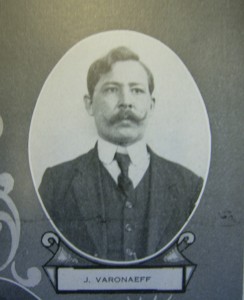 The following article comprises the available documents on the life and ministry of Rev. Ivan Voronaev drafted as a chronological outline for a longer paper, which will be presented at the 2010 SPS meeting in Minneapolis. The materials were gathered from several archives across the United States among which were three major ones:
The following article comprises the available documents on the life and ministry of Rev. Ivan Voronaev drafted as a chronological outline for a longer paper, which will be presented at the 2010 SPS meeting in Minneapolis. The materials were gathered from several archives across the United States among which were three major ones:
(1) The Flower Pentecostal Heritage Center where Voronaev’s ministerial records and his reports to Pentecostal periodicals are kept;
(2) The Southern Baptist Historical Library & Archives, where records of Voronaev’s publication are preserved;
(3) The Graduate Theological Union of Berkeley, which holds in archive the California Baptist records, where much could be found about Vornoaev’s early minister in the United States (California, Oregon and Washington State) as an ordained Baptist minister.
1886: Ivan Ephremovitch Voronaev was born in Russia under the name of Nikita Petrovitch Tcherkesov.
1908: Having married Ekaterina Bahskirova, Tcherkesov received Christ as his personal savior, during a visit to a Baptist church service, while serving in the Tzar’s army. Shortly thereafter, he was court-martialed for his refusal to bеаr arms. In order to escape, he was provided with the passport of a Christian brother from the Tashkent Baptist Church, whose identity he took for the remaining of his life under the name of Ivan Ephremovitch Voronaev.
1910: Together with his family Voronaev crossed the Chinese border and remained for a short time in the city of Carbin, Manchuria, where he preached in the Baptist church and work in the bank of one of the church members by the name of Shubin.
August 25, 1912: The Voronaev family, along with their two children, after receiving visas for the United States through the consulate in the Japanese port city of Kobe, arrived in San Francisco. Voronaev began working with the First Russian Baptist Church in town, which was founded several years earlier on 928 Atkinson Street by S. K. Kunakov. Voronaev also worked as a typesetter, travelled and preached to the Russian communities in Los Angeles and Seattle, where he established a Baptist church and a mission. Meanwhile, he began publishing the “Truth and Love” magazine for the Russian speaking emigrants.
November, 1912: Voronaev is mentioned for a first time in the annual report of the North California Baptist Convention as a newly accepted minister.
February, 1913: A revival began among the Russian Baptists in Los Angeles and they requested the sending of Voronaev to minister among them.
September 18, 1913: The San Francisco Bay Baptist Association held its meeting at the Russian Baptist Church in town. Voronaev was represented as a pastor, who led the benediction. North California Baptist Convention ordained him as pastor in San Francisco. While living in town, Voronaev attended Berkeley Baptist Divinity School for three years, although school archives do not have his student records. Later on, when ministering in Odessa, Voronaev receives Assemblies of God ordination thanks to his seminary preparation and ministry as a Baptist pastor. In a handwritten request to Assemblies of God headquarters, he points out his date of ordination as October 17, 1913, while the ministerial certificate which he receives as evangelist and pastor in Bulgaria is dated March 10, 1920.
1914: S. Gromov assumes the pastoral position at the Russian Baptist Church of San Francisco, after Voronaev had left for unknown reasons. According to Voronaev, this is the time when he first hears about the teaching of Pentecost while ministering in Los Angeles.
November, 1915: Voronaev arrived in Seattle to begin work among the Russian emigrants and renews the publication of the “Truth and Love” periodical.
October 1916-1917: Voronaev was mentioned in the annual reports of the Baptist Convention of West Washington State as Russian missionary in Seattle.
October 1918: Voronaev was mentioned in the annual reports of the Baptist Convention West of Washington State again, but now as a pastor. The Russian group met regularly at the church pastored by Earners Williams who will later serve as Assemblies of God superintendent in the period 1929-1949. It was Williams who introduced Voronaev to the Pentecostal doctrine.
1917: A number of members of the Russian Diaspora in California and of the Russian Baptist community returned to Russia after the Bolshevik Revolution. The Baptist Church of San Francisco went through a period of church split in 1915-1916, noted in the record of the Baptist Association, as follows: “During the past year this church has passed through dark days on account of the interference of a man of the Pentecostal faith …”
November, 1917: Voronaev organized a Baptist church on Henry Street in New York. His family is befriended by their neighbors by the name of Siritz who are Pentecostal Christians.
1918-1919: The New York Baptist Association reports Voronaev as a pastor of the New York Baptist Church organized in 1916. The church has 10 members in 1917 and 18 in 1918. The 1920 report states that the church has remained without a pastor in the middle of 1919.
June, 1919: Voronaev receives the baptism of Pentecost after his daughter began attending Glad Tidings Tabernacle (Hall).
July 1, 1919: Along with some 20 believers, Voronaev left the Baptist denomination and founded the first Russian Pentecostal Assembly of New York, which held meetings at the building of the 6th Street Presbyterian Church.
Fall of 1919: In a cottage prayer meeting at the home of Koltovich, through the wife Ana, a prophecy was given: “Voronaev, Voronaev, go to Russia!” Voronaev ignored the word until several days later he heard them again while praying alone and obeyed the Heavenly call.
December 13, 1919: Voroneav sent the Pentecostal Evangel a letter which was published under the title “Pray for Russia.”
December 19, 1919: Voroneav contacted the Missionary Department of the Assemblies of God with a letter to H. E. Bell to inquire about Pentecostal believers and missionaries in Russia.
January 1, 1920: Upon Assemblies of God recommendation received in response to his last letter, Voronaev contacted J. Roswell Flower with a request for sponsoring a mission trip to Russia. In return, the “Evangelization of Russia” fund was open. In the letter, Voronaev changed the name of his church from “Russian Christian Apostolic Mission of New York” to “First Russian Pentecostal Assembly of New York.”
March 10, 1920: Assemblies of God issued Voronaev a certificate as a “pastor and evangelist in Bulgaria” valid till September 1, 1921.
June 22, 1920: Voronaev notifies the Assemblies of God about his plans to set sail for Russia with his family on July 13, 1920. The Missionary Department marked the letter with the words: “He plans to return to Russia.”
July 13, 1920: The Voronaev, Koltovitch and Zaplishny’s families set sail on the “Madonna” steamboat from New York to Constantinople. Along with them traveled a group of Kavkaz believers among which was the Bulgarian Boris Klibok.
August 10, 1920: After arriving to Constantinople, they had to wait for visas to enter Russia. Voronaev immediately began meeting with the Russian community in town recognizing the lack of Russian Bibles and Pentecostal churches.
August 15, 1920: „ ….with the help of God opened Russian mission here [Constantinople], and God our work blessed;” Voronaev wrote.
August 30, 1920: „…. we had first baptism with water in river. I baptized one lady wife of a Russian office. Glory to Jesus!”
September 2, 1920: Voronaev sent the Assemblies of God a report about his work in Turkey, which is marked by the receiver with “Works among 100,000 Russian refugees in Constantinople.
September 1920: The annual report of the San Francisco Bay Baptist Association recorded the reuniting of the Baptist church split in 1917.
November, 1920: After waiting for three months in Constantinople, Voronaev arrive in the Bulgarian port city of Bourgas along with the Bulgarian Boris Klibok.
March 5, 1921: The Pentecostal Evangel published Voronaev’s report from Bulgaria where he has been holding Russian-Bulgarian revival services in various churches in the cities of Sliven, Yambol, Varna and Sofia. Seven had received the baptism with the Holy Spirit.
April 16, 1921: The Pentecostal Evangel published Voronaev’s second report from Bulgaria about services in Sliven, Bourgas, Plovdiv and the Baptist Church in Stara Zagora where the daughter of the Baptist pastor from Kazanlak received the baptism with the Holy Spirit.
May 14, 1921: Services in the Congregational Church in Plovdiv and baptismal service in the Martiza River.
June 11, 1921: „In Bourgas, Bulgaria the Lord baptized with the Holy Spirit about fourteen souls. We have about twenty candidates for baptism with water, and about thousand Bulgarians and Russian were there and were much interested.”
July, 1921: The Latter Rain Evangel published an article under the title “Pentecost in Bulgaria” in which Voronaev wrote about new Pentecostal believers in seven Bulgarian cities, his relocation in Varna to work with the local Methodist church and his plan to move to Odessa. The Pentecostal Evangel from the same month wrote, “God called Brother J.W. Voronaeff, who had charge of a Russian Pentecostal Assembly in New York City, to Russia.”
August 6, 1921: The Pentecostal Evangel reported Voronaev to be working “among Russian refuges in Varna at the Black Sea.” The same issue records Voronaev’s apparent intent to move to Odessa: “Brother J.E. Voronaeff writes that the Lord could use American missionaries in Bulgaria. At the present time He particularly needs two Americans, a man and his wife. Anyone who feels a burden for carrying the Gospel to the Bulgarian and Russian people can address Brother Voronaeff through this office.”
August 21, 1921: The Voronaev and Koltovitch families received the long-awaited visas for Russia and moved to Odessa.







